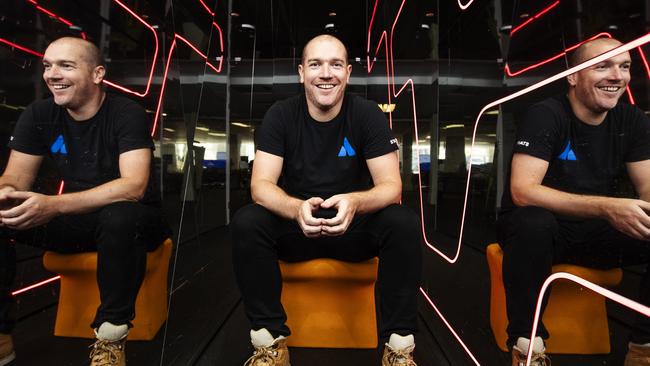Atlassian ups the ante in tech talent war: ‘Don’t want to return to office, then come work for us’
Australian software giant Atlassian has taken a dig at rivals’ return-to-the-office order and says it has more than 300 jobs available to those who don’t want to go back.

Australia’s talent war is intensifying, as software giant Atlassian seeks to poach staff whose bosses have ordered them back to the office as the pandemic era of remote working draws to a close.
Amazon chief executive Andy Jassy has said that from next month he wants all the company’s office-based stuff back in the office five days a week. Tabcorp boss Gillon McLachlan, Flight Centre and the NSW government have also called time on working from home.
More companies are enforcing minimum work-from-office days to foster greater collaboration between staff and mentorship of younger staff – some of whom started their careers during pandemic-enforced lockdowns where they had no choice but to work from home – and lift flatlining productivity.
Atlassia head of Team Anywhere Annie Dean has criticised Amazon’s decision as “wilfully endorsing the old way as a solution to new problems”.
It has created an opportunity for Atlassian, which has a market value of $US42.3bn. Australia will need another 300,000 tech workers by the end of the decade, exceeding the capacity of universities – and overall unemployment is low at 4.2 per cent, sparking a competitive recruitment market.
Atlassian says it has more than 300 jobs available – and not just tech roles. It encourages those who don’t want to return to the office to consider applying for one of its vacancies.
Atlassian work futurist Dom Price said he was not “going to hate” on companies which enforce return-to-office mandates on staff; this was despite Atlassian’s co-founder and chief executive Mike Cannon-Brookes branding such orders “draconian”.
Mr Price said it was about offering choice.
“If that (returning to the office) is the employee value proposition that they think works for the majority of their people, stakeholders, customers, and shareholders, then that’s their job as a leader. As long as they communicate with transparency and they are fair to their people, then I’m OK,” Mr Price wrote on LinkedIn.
“Now, on to the people. Companies tend to make decisions for the majority, and not everyone. So if you’re somewhere and there’s been a mandate that demonstrably changes your life (for the worse), then l’d love to let you know that Atlassian is hiring.
“As are many other companies that offer flexibility in where you work. As of today, we have 304 roles open around the world, across sales, marketing, engineering, product management, design, program management, support, security, finance, legal, HR and others.”
Mr Price said some roles required employees to work in the same time zones as colleagues and were open to people who wanted to consider hybrid arrangements, spending time working remotely and in offices, including its $1.4bn Tech Central development in Sydney which is slated for completion in 2027.
“We do have offices too for those that have preference, and you can see our hubs in Sydney, SF (San Francisco), Austin, Poland, Holland, India, Germany, France, UK, Japan,” he said.
“I appreciate that I get to thrive at work and life; that I get to achieve my goals and be a good dad; that I can knock a project out of the park and be home for dinner.”
Atlassian’s move comes as Robert Half director Nicole Gorton said there had been a noticeable change in recruitment, as more organisations stipulate new employees work in the office four or five days a week.
Meanwhile, about two thirds (65 per cent) of more than 2400 readers who recently participated in an online poll conducted by The Australian believe employers should insist staff return to the office five days a week.
But some of Australia’s biggest businesses are still advocating flexible work arrangements.
Medibank people, spaces and sustainability boss Kylie Bishop said the health insurer’s flexibility and hybrid working model was a “key differentiator”.
Telstra’s Niki Rose, supported hybrid work arrangements. “We know our people are at their best when they have choice,” she said.
Brisbane-based Brighter Super has just signed a new enterprise agreement with its 270 employees that increases work from home flexibility.






To join the conversation, please log in. Don't have an account? Register
Join the conversation, you are commenting as Logout